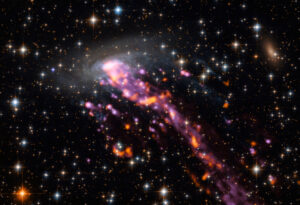One of the key open questions in extragalactic astronomy is what stops star formation in galaxies. While it is clear that the cold gas reservoir, which fuels the formation of new stars, must be affected first, how this happens and what are the dominant physical mechanisms involved is still a matter of debate.
At least for satellite galaxies, which are located within massive clusters that contain thousands of galaxies, environmental effects are generally thought to play an important, if not dominant, role. In nearby clusters, we see examples of cold gas being removed from the star-forming discs of galaxies moving through the hot intracluster medium, but whether active stripping is widespread and/or necessary to halt star formation in satellites, or quenching is just a consequence of the inability of these galaxies to replenish their cold gas reservoirs, remains unclear.
To answer these questions, we designed a new survey called MAUVE (MUSE and ALMA Unveiling the Virgo Environment), which is about to observe 40 galaxies in the Virgo Cluster with the VLT/MUSE instrument. Together with detailed observations of the molecular and atomic gas already available, we will be able to simultaneously trace the current star-formation rate, past star-formation history, gas ionisation state, gas and stellar kinematics for these galaxies, which sample different stages of infall into the cluster. This will allow us to uncover what happens to the interstellar medium and star formation of galaxies during their dive into the cluster, from their first infall to pericentre approach and beyond.
We offer projects suitable for both Master and PhD students based on this new survey, which assembles observations obtained with state-of- the-art ground- and space-based facilities (ESO/VLT, ALMA, GALEX and more).

Example of a jellyfish galaxy that’s undergoing tidal stripping as it moves through a galaxy cluster. [ALMA / ESO / NAOJ / NRAO / P. Jachym et al.]

